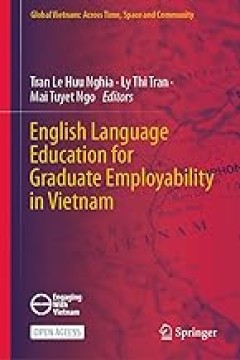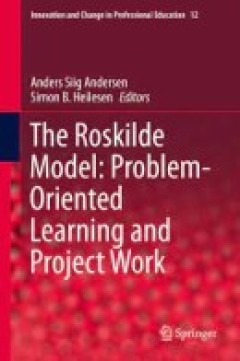Filter by

Handbook of Teaching Competency Development in Higher Education
This is an open access book. It draws from relevant theories and approaches to teachers’ professional development (TPD) and innovative and inspiring TPD practices in higher education. It first lays a solid foundation for the rest of the book, through critiquing prevalent theories, approaches, and teaching competency frameworks guiding TPD in higher education, and defining the key concepts rel…
- Edition
- -
- ISBN/ISSN
- 978-981-99-6273-0
- Collation
- X, 158
- Series Title
- -
- Call Number
- -

Using Social Theory in Higher Education
This open access book offers a unique and refreshing view on working with social theory in higher education. Using engaging first-person accounts coupled with critical intellectual analysis, the authors demonstrate how theory is grappled with as part of an ongoing practice rather than a momentary disembodied encounter. In a structure that creates a space for relational dialogue, each chapter is…
- Edition
- -
- ISBN/ISSN
- 978-3-031-39817-9
- Collation
- XIV, 284
- Series Title
- -
- Call Number
- -

Leadership in Educational Contexts in Finland
This open access book provides a comprehensive overview and in-depth coverage of contemporary aspects of leadership in the field of education in Finland. It brings together Finnish scholars to critically explore and discuss leadership in education in the context of the Finnish education system and in relation to international discourses around the topic. It discusses the phenomenon of leade…
- Edition
- -
- ISBN/ISSN
- 978-3-031-37603-0
- Collation
- XI, 390
- Series Title
- -
- Call Number
- -

First-in-Family Students, University Experience and Family Life
This open access book, now in its second edition, offers a comprehensive overview of the experiences of First in Family (FiF) or first-generation students in higher education. It draws upon narratives of students and their family members and spans the entire university student life cycle (pre-entry, commencement, progression and graduation) with a focus on specific cohorts including mature-aged…
- Edition
- -
- ISBN/ISSN
- 978-3-031-34450-3
- Collation
- XXIII, 294
- Series Title
- -
- Call Number
- -

English Language Education for Graduate Employability in Vietnam
This open access book examines the teaching and learning of English for employability in Vietnamese higher education. Its content is framed within one country to better examine the research issues within the influence of contextual factors. This book investigates how English can contribute to the development of students' employability capitals, particularly in the aspects of human capital, soci…
- Edition
- -
- ISBN/ISSN
- 978-981-99-4337-1
- Collation
- XVIII, 380
- Series Title
- -
- Call Number
- -

Manual of Argumentation, for High Schools and Academies
The increasing interest taken in debate by the larger high schools and academies has prompted the preparation of this Manual of Argumentation. There has seemed to be need of a book that would present in a clear and simple way the elements of debate to that large class of students who are not advanced enough to master the rather difficult college text-books on the subject, but who are deeply int…
- Edition
- -
- ISBN/ISSN
- -
- Collation
- -
- Series Title
- -
- Call Number
- 378

Girls coming to tech! :a history of American engineering education for women
"Engineering education in the United States was long regarded as masculine territory. For decades, women who studied or worked in engineering were popularly perceived as oddities, outcasts, unfeminine (or inappropriately feminine in a male world). In Girls Coming to Tech!, Amy Bix tells the story of how women gained entrance to the traditionally male field of engineering in American higher educ…
- Edition
- -
- ISBN/ISSN
- 9781461957249
- Collation
- 1 online resource (xii, 360 pages) :illustrations.
- Series Title
- -
- Call Number
- -

Changing Governance in Universities : Italian Higher Education in Comparative…
“This book is one of the very few analyses to carry out a comparison between the evolution of the Italian higher education system and other European systems. … this monograph analyzes with great accuracy and from an original viewpoint the basic weaknesses of a not so atypical case, which might suggest useful reflections for other HE systems at a general level.” (Roberto Moscati, European …
- Edition
- -
- ISBN/ISSN
- 978-1-137-54817-7
- Collation
- -
- Series Title
- -
- Call Number
- 378

Higher Education, Social Class and Social Mobility the Degree Generation
This book explores higher education, social class and social mobility from the point of view of those most intimately involved: the undergraduate students. It is based on a project which followed a cohort of young undergraduate students at Bristol's two universities in the UK through from their first year of study for the following three years, when most of them were about to enter the labour m…
- Edition
- 1
- ISBN/ISSN
- 978-1-137-53480-4
- Collation
- XXI, 188
- Series Title
- -
- Call Number
- 370 BAT h

The Roskilde Model: Problem-Oriented Learning and Project Work
This book describes the pedagogical foundations of the Roskilde Model of education and educational design. It presents knowledge about how principles of problem-oriented, interdisciplinary and participant-directed project work may serve as a basis for planning and applying educational activities at institutions of higher learning. It discusses the dilemmas, problems, and diverging views that ha…
- Edition
- 2
- ISBN/ISSN
- 978-3-319-09716-9
- Collation
- -
- Series Title
- -
- Call Number
- -
 Computer Science, Information & General Works
Computer Science, Information & General Works  Philosophy & Psychology
Philosophy & Psychology  Religion
Religion  Social Sciences
Social Sciences  Language
Language  Pure Science
Pure Science  Applied Sciences
Applied Sciences  Art & Recreation
Art & Recreation  Literature
Literature  History & Geography
History & Geography